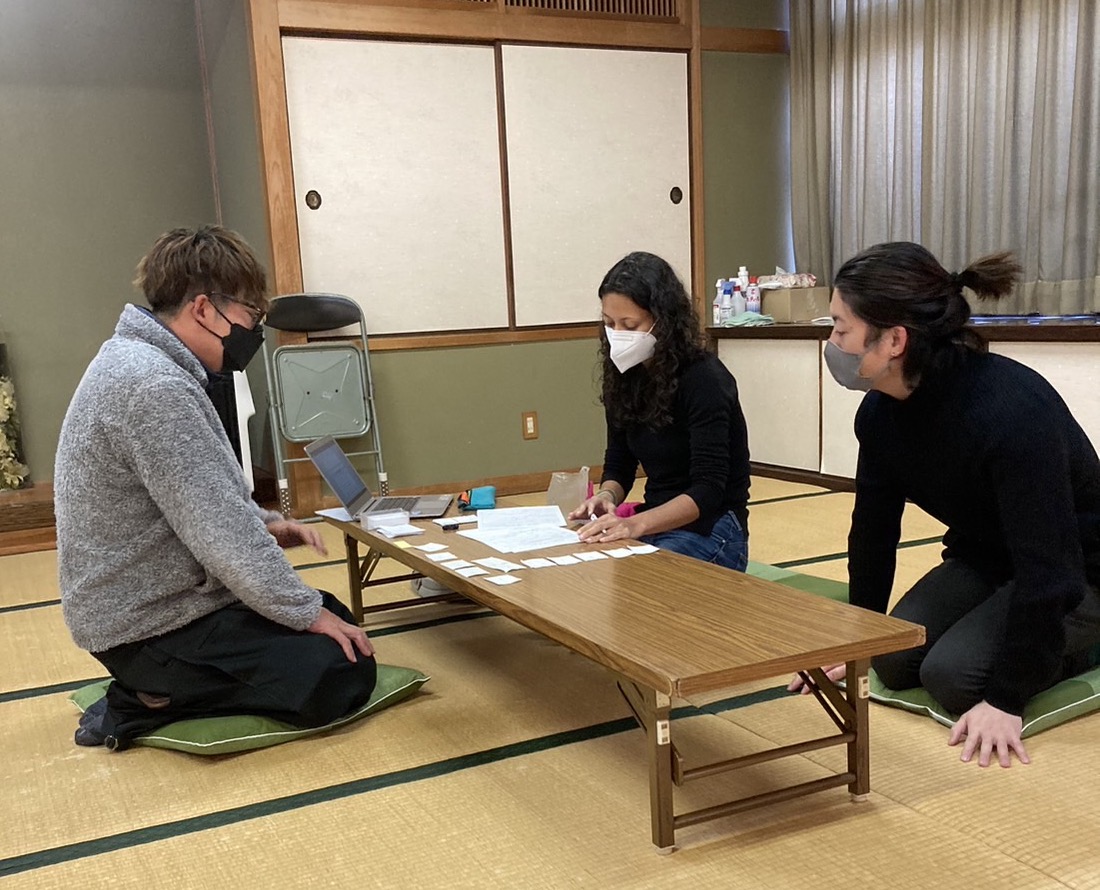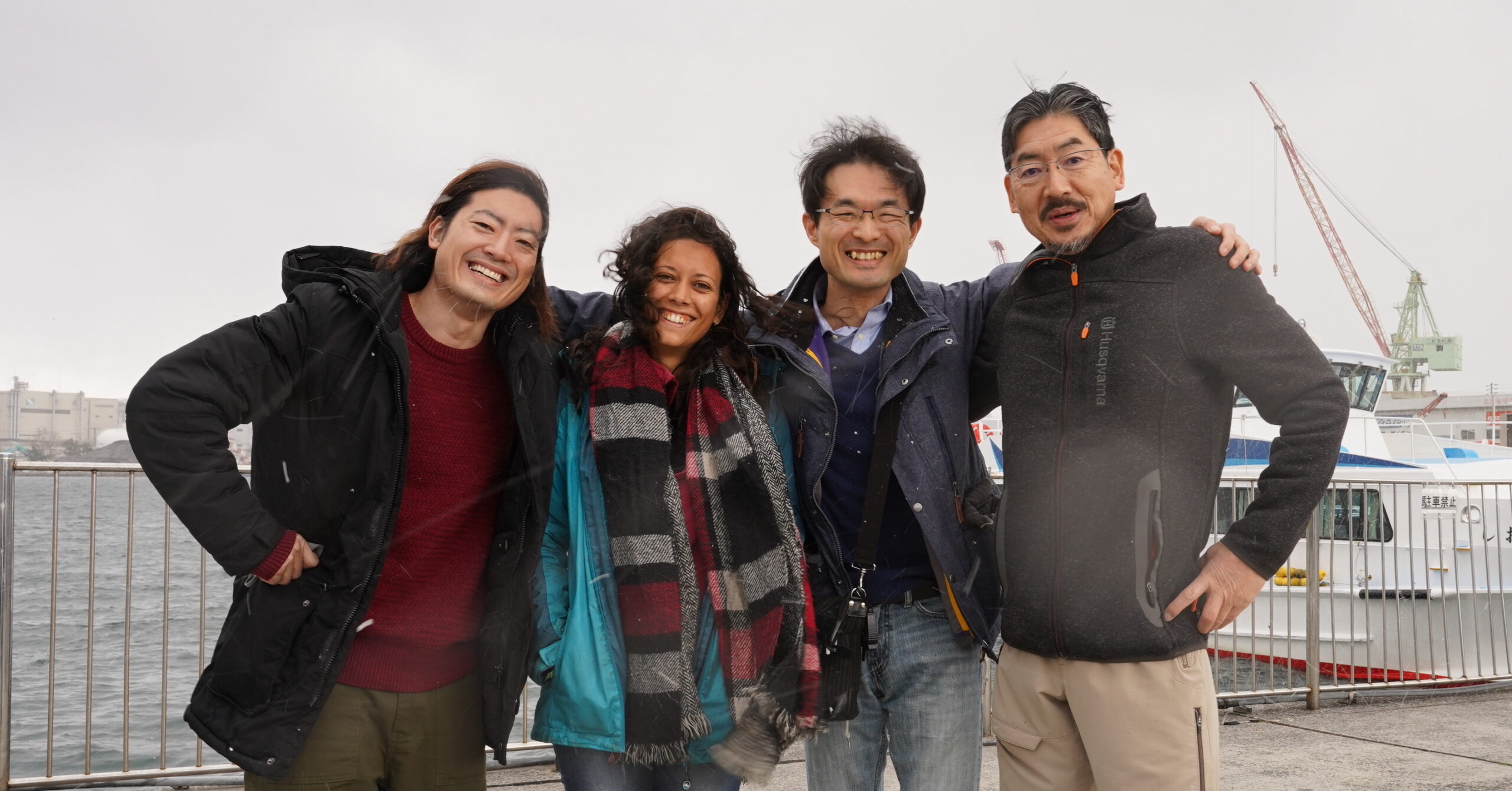Joint Release by National Institute for Environmental Studies (NIES), Japan, and Hokkaido University, Japan.
A new scientific study reveals the complex relationship between the impacts of climate change and the adaptive responses of coastal fishers in the southern coasts of Japan.

Xochitl Édua Elías Ilosvay (researcher) and Kazuki Seike (translator) during a personal interview with a coastal fisher at a Fisheries Cooperative Association in the northern region of Shikoku Island. (Credit: Kameyuki Seike)
A new scientific study published this Wednesday in the journal People and Nature reveals the complex relationship between the impacts of climate change and the adaptive responses of coastal fishers in one of the areas most affected by these environmental changes: the southern coasts of Japan. Warming waters and strong currents flowing northward are rapidly transforming the macroalgal beds along these coasts, as reef-building corals, subtropical herbivorous fish, and other warm-water species expand their territory northward. This global phenomenon, known as tropicalization, is threatening temperate ecosystems worldwide, from macroalgal beds in Japan and Australia to seagrass meadows in the Gulf of Mexico and the Mediterranean, altering the composition of species and the services these ecosystems provide. However, there is little evidence on how these fishing communities are being affected and how they are adapting to these changes, making adaptive management difficult. This research contributes to filling that gap in science and policy.
The study was part of an international Ph.D. conducted by the lead author, Dr. Xochitl Édua Elías Ilosvay, in the research group Future Oceans Lab at CIM-University of Vigo (Spain), under the supervision of researchers Elena Ojea, head of this research team at UVigo's Marine Research Center (CIM), and Jorge García Molinos, from Hokkaido University in Japan. It also involved collaboration with Naoki H. Kumagai from Japan's National Institute for Environmental Studies, participation from Japanese researchers at the Kuroshio Biological Research Institute, and support from local community members, Kameyuki Seike and Kazuki Seike, during field studies.
Personal interviews with over one hundred fishers from Shikoku
The researchers involved in this project conducted in-person interviews with over a hundred fishers from 25 fishing communities along the entire west coast of Shikoku, Japan's fourth-largest island. These communities are located in three regions that vary in their exposure to tropicalization, ranging from ecosystems entirely dominated by tropical corals in the south, to mixed ecosystems in the central region, and the last remaining temperate macroalgal beds in the north. "These fishing communities provided a natural laboratory to understand to what extent adaptation responses reflect the natural gradient of exposure to ecological changes," explains Xochitl E. Elías, adding that the goal of the study was to assess whether the adaptation responses of fishers were more influenced by the intensity of ecological change (referred to as the "adaptation continuum") or by their socio-economic context.
The results showed that while fishers in the central region, where tropicalization is more dynamic, mainly adopted adaptation strategies ("such as reducing fishing expenses or seeking new species," as the authors explain in the article), in the other two regions, non-action responses predominated. The prevalence of inaction in the southern region, where tropical changes have been present for longer, contradicts the idea of an adaptation continuum, which suggests that as impacts increase, fishers should transition from adaptation strategies to deeper transformations when these strategies are no longer sufficient.
The authors attribute this result to the fact that transformative responses in the south, such as abandoning fishing, may have occurred earlier (only active fishers were interviewed), which is supported by the decline in the fishing population in the region. However, the level of exposure did not clearly influence the fisher's willingness to implement transformative changes. That willingness was more related to their social and economic circumstances. Specifically, households that relied primarily on fishing for income and food were more likely to adapt but less likely to transform, while fishers involved in coastal aquaculture were more willing to make profound changes than those engaged in extractive fishing. This finding highlights the need to address climate change mitigation and social adaptation simultaneously.
Importance of anticipating and implementing adaptive strategies
In a country where coastal fishing and aquaculture represent nearly half of the total fishing production and significantly contribute to employment in the sector, these results underscore the importance of integrating environmental, socio-economic, and cultural considerations into policies that aim to protect the livelihoods of fishers from environmental changes. Globally, the study emphasizes the value of conducting research in climate change hotspots to offer insights that can help anticipate and implement adaptive and transformative strategies in other regions of the world that will inevitably face the impacts of climate change in the future.

Fieldwork research team (left to right): Kazuki Seike (fieldwork translator), Xochitl Édua Elías Ilosvay (researcher from the University of Vigo), Naoki Kumagai (researcher from the National Institute for Environmental Studies), and Kameyuki Seike (supporting fieldwork logistics and local stakeholder engagement). (Credit: Naoki Kumagai)
The press release from the University of Vigo, in Galician, can be found here.
Original Article:
Xochitl Édua Elías Ilosvay, Naoki H. Kumagai, Jorge García Molinos, Elena Ojea. Coastal fisheries adaptations to increasing climate change exposure in Japan. People and Nature. October 23, 2024.
DOI: 10.1002/pan3.10727
Funding:
This work was supported by JSPS Grant-in-Aid for Scientific Research(B) JP19H04322, Climate Change Adaptation Research Program (NIES), Harmonization with Nature Research Program (NIES), the European Research Council Starting Grant no. 679812, the Xunta de Galicia Excellence project-ED431F 2023/37, and the University of Vigo for a PhD scholarship and travel funds.






